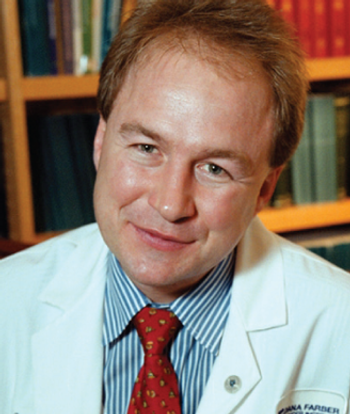
Phase II data provide further evidence that patients with relapsed/refractory chronic lymphocytic leukemia with 17p deletion have a new treatment option with ibrutinib.

Your AI-Trained Oncology Knowledge Connection!


Phase II data provide further evidence that patients with relapsed/refractory chronic lymphocytic leukemia with 17p deletion have a new treatment option with ibrutinib.

The monoclonal antibody rituximab (Rituxan) improves event-free survival (EFS) among adults with CD20-positive B-cell acute lymphoblastic leukemia (ALL), according to authors of a phase III clinical trial conducted in France and Switzerland.

The combination of dasatinib (Sprycel) and venetoclax (Venclexta) may have the potential to improve the treatment of Philadelphia chromosome-positive acute lymphoblastic leukemia (Ph+ALL), according to Oregon researchers.

A study found that the protein EZH2 is required for chronic myeloid leukemia initiating cells to survive. Inhibiting EZH2 could improve outcomes in TKI-resistant disease.

Patients with Hodgkin lymphoma have a high incidence of severe acute and persistent fatigue, regardless of their tumor stage or the treatment method chosen for their disease.

This review discusses the mechanisms of action, clinical development, and emerging applications of small-molecule inhibitors that target B-cell receptor signaling pathways, B-cell lymphoma-2 inhibitors, selective inhibitors of nuclear export, and epigenetic modifiers.

Prior to the advent of targeted therapies, there were few options other than chemotherapy for the treatment of patients with indolent B-cell lymphomas or chronic lymphocytic leukemia.

Combining venetoclax (Venclexta, AbbVie and Genentech) plus a tyrosine kinase inhibitor targeting the BCR-ABL oncogene can eradicate chronic myeloid leukemia stem cells in a mouse model of the disease.

Use of lenalidomide monotherapy in patients with adult T-cell leukemia/lymphoma resulted in clinically meaningful antitumor activity, with 42% of phase II trial participants having objective responses.

Many adolescent girls with leukemia did not receive pregnancy screening before undergoing teratogenic exposure.

Genmab recently announced that the US Food and Drug Administration has approved ofatumumab (Arzerra®) combined with fludarabine and cyclophosphamide (FC) for patients with relapsed chronic lymphocytic leukemia.

The addition of carfilzomib to lenalidomide and dexamethasone improved health-related quality of life compared with treatment with lenalidomide/dexamethasone alone among patients with relapsed multiple myeloma enrolled in the ASPIRE trial.

Dr. Amitkumar Mehta talks about the various effects of daratumumab on multiple myeloma cells.

The quantification of a patient’s MRD after treatment for CLL allowed for a more specific prediction of progression-free survival among patients who responded to treatment.

Adding the CD38-targeting monoclonal antibody daratumumab to bortezomib and dexamethasone resulted in significantly improved progression-free survival in patients with heavily pretreated multiple myeloma.

Data from the large, population-based EUTOS registry showed strong survival outcomes in patients with CML, and validated risk scores as prognostic of outcome.

Socioeconomic factors affected the care and survival of younger patients with multiple myeloma, but race/ethnicity itself did not influence survival.

The FDA is granting Orphan Drug Designation for chimeric antigen receptor engineered T-cells directed against the target protein CD4 (CD4CAR) for the treatment of peripheral T-cell lymphoma.

Patients with chronic lymphocytic leukemia (CLL) taking ibrutinib showed an antibody response to the influenza vaccine, according to a data from a small study.

Patients with adult T-cell leukemia/lymphoma treated with mogamulizumab prior to undergoing allo-HSCT were at significantly greater risk for graft-vs-host disease–related mortality.

In this review, we discuss the potential applications of monitoring ctDNA in patients with diffuse large B-cell lymphoma, follicular lymphoma, and mantle cell lymphoma.

An 84-year-old woman with a history of Graves disease, hyperlipidemia, and hypertension presented to her physician with progressive fatigue and palpable bilateral axillary lymphadenopathy.

It is clear that as our understanding of both aggressive and indolent lymphomas improves, the goals of treatment change and the bar for success is set higher.

A propensity score–matched comparison of two phase II trials found that dasatinib and nilotinib offer similar responses and outcomes as first-line therapy for patients with chronic-phase CML.

Myeloma is clearly not one disease but several. In terms of treatment choices, it is increasingly evident that one size of treatment does not fit all. Moreover, as therapy is tailored to each individual patient, with the ability to mobilize and collect stem cells and retain them after successful induction/remission therapy, younger patients have choices.